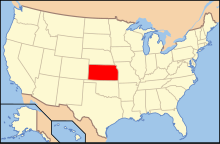LGBTQ rights in Kansas | |
|---|---|
 | |
| Status | Legal since 2003 (Lawrence v. Texas) |
| Gender identity | Transgender people no longer allowed to change legal gender since 2023 |
| Discrimination protections | Sexual orientation and gender identity protections in employment, housing and public accommodations since 2020 |
| Family rights | |
| Recognition of relationships | Same-sex marriage since 2015 |
| Adoption | Same-sex couples allowed to adopt |
Lesbian, gay, bisexual, transgender, and queer (LGBTQ) people in the U.S. state of Kansas have federal protections, but many face some legal challenges on the state level that are not experienced by non-LGBTQ residents. Same-sex sexual activity is legal in Kansas under the US Supreme Court case Lawrence v. Texas, although the state legislature has not repealed its sodomy laws that only apply to same-sex sexual acts. The state has prohibited discrimination on the basis of sexual orientation and gender identity in employment, housing and public accommodations since 2020. Proposed bills restricting preferred gender identity on legal documents, bans on transgender people in women's sports, bathroom use restrictions, among other bills were vetoed numerous times by Democratic Governor Laura Kelly since 2021. However, many of Kelly's vetoes were overridden by the Republican supermajority in the Kansas legislature and became law.
Two lawsuits, one in state court and the other in federal court, challenged the constitutionality of the state's ban on same-sex marriage, and on November 4, 2014, a U.S. District Court judge ruled Kansas' ban on same-sex marriage unconstitutional. His ruling was stayed as the state sought a stay pending appeal without success, and it took effect on November 12, 2014. From November 12, 2014 to the Supreme Court's ruling in Obergefell v. Hodges on June 26, 2015, marriage licenses were generally available to same-sex couples, but the state government continued to deny recognition to same-sex marriages in all other respects.